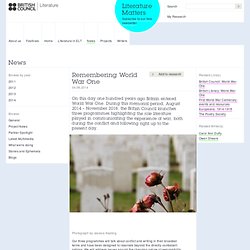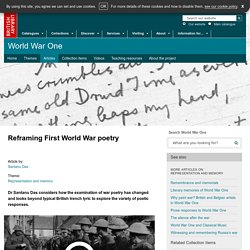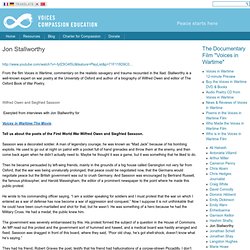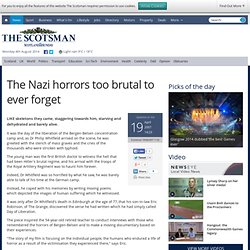

Remembering World War One. On this day one hundred years ago Britain entered World War One.

During this memorial period, August 2014 – November 2018, the British Council launches three programmes highlighting the role literature played in communicating the experience of war, both during the conflict and following right up to the present day. Our three programmes will talk about conflict and writing in their broadest terms and have been designed to resonate beyond the directly combatant nations. We will address issues around the changing nature of responsibility in writing about war and keep a firm eye on how the strength of British WW1 literature – and poetry in particular – informs writing on war today.
We will look at contemporary writing on conflict with a focus on what is being written now around the world, across different platforms and media. We will remember and interrogate the poetry of conflict. International events will kick off at the Krasnoyarsk Book Fair, Russia in October. Reframing First World War poetry - The British Library. Dr Santanu Das considers how the examination of war poetry has changed and looks beyond typical British trench lyric to explore the variety of poetic responses.

Dr Santanu Das gives an introduction to the poetry of the First World War, providing fascinating commentary on a range of topics, supported by literary manuscripts and historical footage. In some papers found in his kit after his death in the Battle of Loos on 13 October 1915, the twenty-year-old Charles Hamilton Sorley had scribbled in pencil what would become one of the most celebrated sonnets of the First World War: When you see millions of the mouthless dead Across your dreams in pale battalions go, Say not soft things as other men have said, That you’ll remember.
For you need not so. Give them not praise. Repeatedly anthologised, yet forever startling. For the scope of First World War poetry is much wider than that of the trench lyric. Joy of Shipwrecks, a book of poetry View images from this item (1) Form and history. A Poem About Poems About Vietnam. Voices Education Project. From the film Voices in Wartime, commentary on the realistic savagery and trauma recounted in the Iliad.

Stallworthy is a well-known expert on war poetry at the University of Oxford and author of a biography of Wilfred Owen and editor of The Oxford Book of War Poetry. Wilfred Owen and Siegfried Sassoon Exerpted from interviews with Jon Stallworthy for Voices in Wartime:The Movie. Tell us about the poets of the First World War Wilfred Owen and Siegfried Sassoon. Sassoon was a decorated soldier. Then he became persuaded by left-wing friends, mainly in the grounds of a big house called Garsington not very far from Oxford, that the war was being unnaturally prolonged, that peace could be negotiated now, that the Germans would negotiate peace but the British government was out to crush Germany. He wrote to his commanding officer saying, “I am a soldier speaking for soldiers and I must protest that the war on which I entered as a war of defense has now become a war of aggression and conquest.”
"Naming of Parts" by Henry Reed. The Nazi horrors too brutal to ever forget. LIKE skeletons they came, staggering towards him, starving and dehydrated and barely alive.

It was the day of the liberation of the Bergen-Belsen concentration camp and, as Dr Philip Whitfield arrived on the scene, he was greeted with the stench of mass graves and the cries of the thousands who were stricken with typhoid. The young man was the first British doctor to witness the hell that had been Hitler's brutal regime, and his arrival with the troops of the Royal Artillery Regiment was to haunt him forever. Indeed, Dr Whitfield was so horrified by what he saw, he was barely able to talk of his time at the German camp. Instead, he coped with his memories by writing moving poems which depicted the images of human suffering which he witnessed. It was only after Dr Whitfield's death in Edinburgh at the age of 77, that his son-in-law Eric Robinson, of The Grange, discovered the verse he had written which he had simply called Day of Liberation. We build our own prison walls, It was holiday time. The 20th Century in Poetry - Simon Rae, Michael Hulse.
Reframing First World War poetry - The British Library.